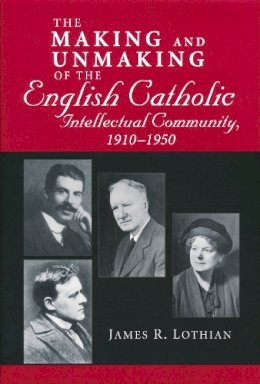James R. Lothian is visiting assistant professor of history at Binghamton University.
“Lothian’s study fills a much needed gap in English Catholic history and also serves as an excellent example of historical scholarship. Thoroughly documented and very well written—Lothian’s combination of personal annotates and ideological information is a genuine tour de force—this study should stimulate a wide range of dissertation topics which hopefully will continue to shed new light on English Catholicism during the inter-war period.” —Anglican and Episcopal History “James Lothian has written an important book on the cultural and political history of the English Catholic community. . . . Lothian’s work is very impressive.” —Political Studies Review “James Lothian sees the impact of Hilaire Belloc on the intellectual formation of English Catholicism in the twentieth century as more than the effect of personal influence upon fellow writers and thinkers, rather as a major catalytic force in the construction of a corporate voice for Catholicism in the face of contemporary secular energizing challenges. . . an excellent study on a difficult theme and one that will rapidly become a seminal work.” —Recusant History “The author offers a series of analytical biographies of the key figures, chief among whom were Belloc and Chesterton. Lothian ably charts the rise of the English Catholic Intellectual community from the political Catholicism of Belloc and its demise after the Second World War when the political and economic themes of Belloc and Chesterton were displaced by the theological and philosophical interests of figures such as the publishers F. Sheed and his wife M. Ward, under the moderating influence of the historian C. Dawson.” —Religious Studies Review “The Making and Unmaking of the English Catholic Intellectual Community deserves respectful consideration. . . . Lothian makes it harder to ignore Catholicism’s resurgence in the British public mind, a salutary reminder that a sacramental faith encompasses both eschatology and sociology.” —The Catholic Historical Review “There is much to admire here, with extensive research on unpublished correspondence complementing Lothian’s wide-ranging familiarity with the published writings of his subjects. The book provides valuable accounts of hitherto neglected individuals and enhances understanding of more familiar figures such as Chesterton, Gill, and Belloc himself.” —American Historical Review “. . . there are many fine biographies of Belloc, Chesterton, Eric Gill, David Jones and Evelyn Waugh . . . James Lothian admirably provides a collective biography of three generations of these leaders, showing how they learned from and influenced each other and, finally, how their collective identity shattered. Lothian charts the rise of new Catholic leaders, including Maisie Ward and Frank Sheed, showing the maturing of Catholic political thought.” —Catholic Library World “Lothian, a history professor at the University of Binghamton in New York, presents a comprehensive history of English Catholic thinkers such as Hilaire Belloc, GK Chesterton, Eric Gill and Evelyn Waugh. These intellectuals and others formed a Catholic counterculture of sorts that produced what is now known as ‘political Catholicism.’ Lothian examines this counterculture, its members’ struggle with Catholicism’s negative attitude towards modernity, and their desire to engage with contemporary society.” —Conscience "This book sheds much new light on English Catholic intellectuals in the four decades that encompassed the two world wars. The book builds on but goes well beyond existing scholarship . . . this is a rich and pioneering study that sheds much light on a neglected area of English cultural and intellectual history. The wealth of primary sources on which Lothian has drawn, together with his compelling narrative, critical analysis, and attention to nuance, will ensure that this is a landmark book." —The Journal of British Studies James Lothian's important new book considers the English Catholic world of the first half of the twentieth century as many English Catholics might have wished it to be considered—small but culturally significant, confident but inveterately quarrelsome, patriotic but with a strangely ambiguous loyalty both to Rome and to home. . . . Lothian's examination of this rich and complex community is impressively researched, solidly written, engagingly argued, and in sum, full of fascination. He is to be commended on his achievement." —The Journal of Modern History

